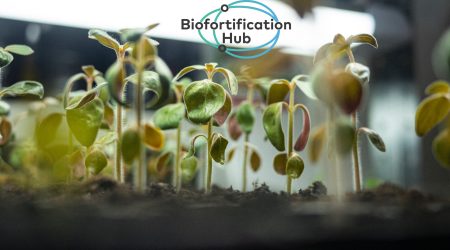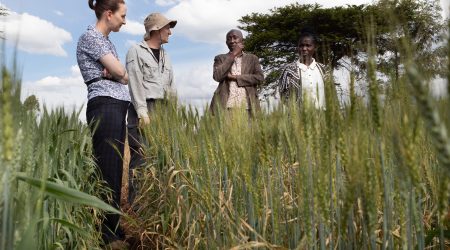The benefits of understanding plant genes; how they work and what controls them

At the John Innes Centre the majority of our research is divided into four ‘Institute Strategic Programmes’ or ‘ISPs’.
One of those; ‘Genes in the Environment’ (GEN) aims to improve our understanding of how plant genes function and what mechanisms control them.
Part of that is understanding how the environment, and in particular temperature, affects plant growth and development, through the regulation of and variation in their genes.
We sat down with GEN Programme Manager Dr Teresa Penfield to look back on the last four years in GEN; and some of the applications coming out of this research?
Improving UK and global food security
“795 million people currently go hungry on a daily basis.
As the global population continues to rise, feeding the world’s population becomes an increasing concern. With global warming disrupting crop production global food security is a major challenge.
However, increasing our knowledge of crop growth and development and subsequently improving our crops and agricultural practices is one positive contribution we can make towards alleviating the global food security challenge.
In the GEN ISP we are improving our understanding of some of the genetic factors which control crop yield.
Understanding the function of and mechanisms controlling plant genes allows us to select for genes and traits which have a positive influence on the way plants grow, such as increased yield or resilience to high temperatures. This information is then used by plant breeders to improve the crops we grow.
Recent examples include,
- A gene called UPL3 is a potential target for improving the yield of oil in oilseed rape. This has been licensed to the seed industry for assessment and once crossed into a commercial variety of oilseed rape we anticipate up to a 10% increase in the yield with the potential to expand into other crops both cereals and oilseeds such as soybean
- In wheat, we have used our understanding for how seed length and width are controlled to generate new lines with the potential to increase yield. Seed has been bulked up so that we can make it available for plant breeders to test. Testing is taking place through the Breeders Toolkit – part of the Designing Future Wheat ISP
- We have further unravelled how the cold temperatures a plant experiences in autumn and winter influence when it flowers. This is important for crop scheduling and has also allowed us to develop a new short generation broccoli which will enable broccoli production all year round within the UK, reducing imports, waste and reliance on overseas production
Developing and improving technology
GEN research both uses and develops new cutting-edge technology, some of which we can share with other researchers and with industry to enhance capability and efficiency.
One example is SeedGerm, an automated platform for scoring seed germination using imaging alongside Artificial Intelligence. This is a useful tool in the lab and it has been developed and expanded to test suitability for a range of crops.
SeedGerm is now being used by plant breeding companies to assess pre-commercial oilseed rape lines for germination vigour, an important trait for ensuring the crop establishes well in the field.
Another tool we developed to quantify seed loss in Brassicas, known as the Random Impact Test System is now being investigated by the Agriculture and Horticultural Development Board with the aim of incorporating testing of oilseed rape varieties. This could provide information on podshatter in oilseed rape and enable them to include this assessment in their “Recommended List” which would provide farmers with independently assessed information.
We have developed computational and visualisation tools such as MorphoGraphX, allowing us to measure everything from the sizes, locations and divisions of cells during leaf growth to crop development in trial plots in the field.
Providing valuable expertise to industry
GEN researchers are experts in their field and this knowledge can be applied to a wide range of challenges.
For example, we have developed advanced research capabilities in genome engineering and are using this expertise to provide training in crop transformation and genome editing.
Our recent CRISPR field trial in oilseed rape, was the first CRISPR trial to take place in the UK after an EU ruling which classified CRISPR modification as genetic modification. Our expertise now puts us in a strong position for advising policy makers on using this technology.
Our knowledge is also being used with industry, for example we are working with a company LettUs Grow to optimise the lighting regimes used in aeroponic technology within vertical farms, using our knowledge of light, circadian rhythms and plant growth.
We have over 150 scientists working across GEN on a range of projects all of which provide valuable insights into plant growth and development, many of which can be used to deliver benefits to industry and wider society, helping us to address global challenges such as global food security and climate change.”



